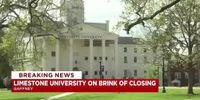In a shocking announcement that has left the community of Gaffney, South Carolina, reeling, Limestone University revealed on April 16, 2025, that it may close its doors after 179 years unless it can secure a $6 million emergency fund by April 22. The institution, known for its commitment to liberal arts education, is facing severe financial difficulties, including a staggering $30 million in debt.
Limestone University, located about 55 miles southwest of Charlotte, North Carolina, has been a cornerstone of education in the region since its founding in 1845. Initially established as a women’s college, it became coeducational in the early 1990s. The university has played a significant role in the local community, contributing an estimated $150 million annually to Cherokee County’s economy. However, declining enrollment and rising operational costs have put the institution in jeopardy.
Randall Richardson, chair of the university's board of trustees, stated, “Without immediate financial support, we will have no choice but to move all operations online, which means closing our physical campus.” The board is expected to meet on April 22 to make a final decision regarding the university's future. If the school does not receive the necessary funds, all in-person classes will cease by the end of the spring semester on April 29, and approximately 300 employees will be laid off.
The news has sent shockwaves through the student body, particularly among the athletic programs. Limestone competes in the South Atlantic Conference as a Division II school, and its football team recently finished an impressive 8-3 overall and 6-2 in conference play. Matt Hynes, a sophomore offensive lineman from Lake Norman High School, expressed his disbelief: “It was stunning. We had no clue this was coming. There was talk about the school being in debt, but there was never any talk about Limestone shutting down.”
With the potential closure looming, many student-athletes have begun entering the transfer portal in search of new opportunities. Fifteen members of the football team hail from Charlotte-area schools, and several others are involved in soccer, baseball, softball, and lacrosse programs. Independence High football player Brian Crowder and Mooresville High softball player Cadence Lane have both announced they are looking for new schools.
President Nathan Copeland, who took office last year, acknowledged the university's dire financial situation and the challenges faced in securing funding. “We ran out of runway,” said Charles Wyatt, vice president for communications. He emphasized the university's commitment to helping students transfer to other institutions, especially athletes who are at risk of losing their college careers due to the impending closure.
The financial woes of Limestone University are not an isolated incident; they reflect a broader trend affecting small private colleges across the United States. Many institutions are grappling with enrollment declines and increasing operational costs, leading to significant structural pressures. The Charleston Post & Courier reported that Limestone's financial struggles have been compounded by these long-standing issues.
Gaffney Mayor Lyman Dawkins III expressed his concerns about the potential impact of the university's closure on the local community. He noted, “The news of Limestone University’s potential closure is devastating and would be a significant blow to our community. For nearly 180 years, Limestone has served as a cornerstone of our city educationally, economically, and culturally.”
In addition to the emotional toll on students and staff, the closure could have far-reaching economic consequences. Local businesses have relied on the influx of students and their families, and the loss of the university could hinder ongoing revitalization efforts in downtown Gaffney.
In the wake of the announcement, students like Cameron Wells, who transferred to Limestone from Coastal Carolina, voiced their disappointment. “We were just getting things popping,” he lamented. As the April 22 board meeting approaches, families and faculty members are holding onto hope while preparing for the worst.
The university's long history is marked by resilience and adaptation, having survived significant challenges throughout its existence, including the Civil War and the Great Depression. However, the current financial crisis represents an unprecedented challenge that could ultimately end the legacy of Limestone University.
As the board of trustees prepares to make a critical decision, the future of Limestone University hangs in the balance. The institution's leadership has made it clear that they are committed to preserving the university's mission, stating, “Limestone remains committed to our students, and we will work directly with current students to help them identify the best path to successfully complete their educational journey.”
The next few days will be crucial for Limestone University as it seeks to navigate this financial storm. With the community's support and the potential for immediate funding, there may still be a chance to preserve the campus and its rich history for future generations.






